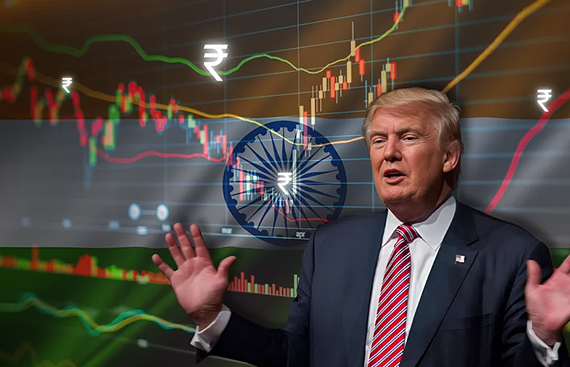Global Funds Reignite Interest in India Amid Trade War Tailwinds
By
siliconindia | Friday, 16 May 2025, 07:00 Hrs

- Foreign Investment Surge: Global funds are returning to India, boosting stock markets and corporate financing amid US-China trade tensions.
- Stock Market Rally: The NSE Nifty 50 Index reached its highest level since October, driven by optimism over a potential India-US trade deal.
- Shapoorji Pallonji Group secured a $3.4 billion private credit deal.
Global investors are making a strong return to Indian markets, buoyed by optimism that Asia’s third-largest economy could emerge as a strategic winner in the ongoing US-China trade conflict. A renewed wave of capital inflows has propelled Indian equities to near seven-month highs, with the NSE Nifty 50 Index recently touching levels not seen since October.
This resurgence in foreign investment reflects growing confidence in India’s economic positioning under the Trump-era trade dynamics. President Trump’s recent favorable remarks about a possible trade agreement with India have amplified hopes that the country could be among the first in Asia to secure a beneficial deal with the US. Market participants believe this could boost India’s integration into global supply chains, especially as multinational corporations seek to diversify away from China.
Corporate India has quickly seized this moment. The Shapoorji Pallonji Group finalized a $3.4 billion private credit agreement, while Reliance Industries secured a $2.98 billion-equivalent loan, signaling renewed appetite among foreign investors for Indian corporate debt. These billion-dollar deals reflect India’s rising appeal not just in equities but in the debt market as well.
Behind the bullish sentiment lies a combination of macroeconomic and monetary support. The Reserve Bank of India’s dovish monetary policy stance has pushed bond yields to a three-year low, making Indian assets more attractive to yield-hungry global investors. According to Trinh Nguyen, senior economist at Natixis, “India does offer both high yield in bonds and decent return on capital for equity investors”, making it a compelling investment destination.
Investment trends back this optimism. After net selling over $25 billion of Indian equities from October to February, foreign institutional investors (FIIs) have reversed course, bringing in more than $2.5 billion this quarter. This turnaround comes despite geopolitical tensions, including the recent India-Pakistan border flare-up, and the broader global volatility induced by the trade war.
A Bank of America Securities survey further highlighted India’s growing prominence, showing Indian equities as the top choice among Asian fund managers. India’s inward-looking economy, large domestic market, and expanding middle class have made it an increasingly attractive safe haven amid the global uncertainty.
Also Read More: How GCCs Are Quietly Powering Global Tech Strategy
India’s relatively low exposure to US tariffs compared to China also positions it as a feasible alternative for multinational firms looking to avoid punitive trade barriers. Companies like Apple Inc. are reportedly eyeing India as a viable manufacturing base to circumvent higher levies on Chinese imports.
Nevertheless, risks remain. Geopolitical tensions and domestic political uncertainties could derail investor confidence. The ongoing need for infrastructure investment and regulatory clarity also weighs on long-term prospects.
Despite these challenges, market sentiment remains positive. “The key assumption is for some agreement on a trade deal between the US and India, coupled with good external and internal macro stability”, said Michael Wan, a senior analyst at MUFG Bank.
As global trade realigns, India appears well-positioned to capture a larger share of investment flows, potentially accelerating its rise as a key player in the global economic landscape.
